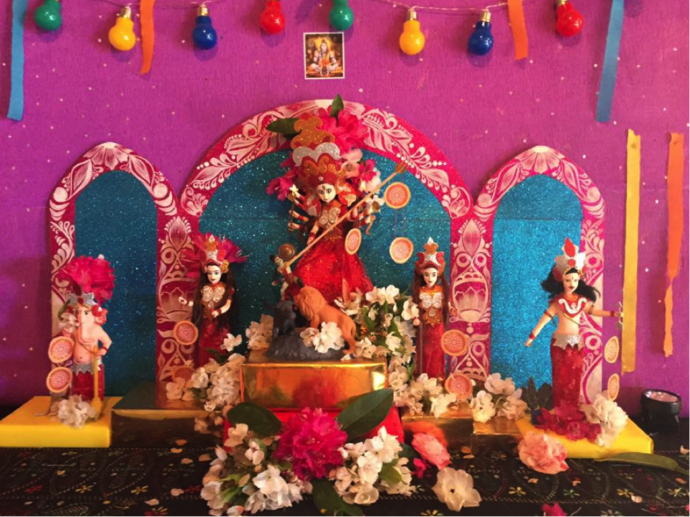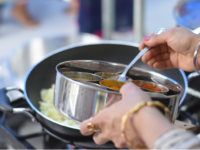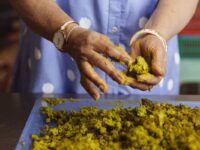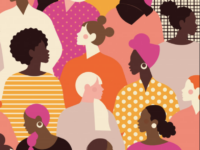How Dunedin organised its first-ever Durga Puja
On my way back to Dunedin after a conference in Queenstown, I got goosebumps when I suddenly spotted ‘kaash phool’-like flowers adorning the roadsides. They made me feel nostalgic, as any thoughtful Bengali would be.

Back home in West Bengal, India, ‘kaash phool’ typically appears by the river banks with the advent of autumn, which marks a characteristic pleasant change in the climatic conditions. This also happens to be the first and foremost sign that Durga Puja is round the corner.
Cut to Dunedin. First week of September is time to gear up for yet another festive occasion. But for me, it is also the time for disappointment, as I would invariably miss another Durga Puja celebration.
But, this year, marked a sudden twist in this tale. A few Bong-enthusiasts (read: Bengali enthusiasts) took the pledge to create history and yes, the rest, as they say, is truly history!
More than 50 people gathered to celebrate the southernmost Durga Puja of the planet, which took place for the first time in Dunedin. It was inaugurated by the honourable Member of Parliament, Mr David Clark.

The event was scheduled from October 30 to September 1, a day-and–a-half celebration over the weekend. We were blessed with a lovely sunny weather. The white drifting clouds with a mild breeze evoked a perfect Durga puja ambience, at the furthest corner from mainland Bengal.
The sounds of dhak (played on audio track), kasor-ghonta, the pushpanjali mantras, the prasad particularly chaal-kola and khichudi-labda, and the queued-up attendees clad in colourful saarees and Punjabi kurtas waiting for bhog collection – each and every component nicely added to the flavour of the auspicious moment of worshiping Ma Durga. On-spot cooking arrangements were also made to prepare luchi, chholar daal, aloor dum and mutton kosha, a perfect Durga Puja menu to satisfy the Bengali palate.
What was most unique about the event was the Goddess’s idol, made locally by Nilanjan Ghosh, a first-year PhD student who has been through the entire process of giving this historical event a grand success. His contribution was of utmost importance because of the lack of preparedness (both financial and operational) to procure the idol from homeland, as the idea was conceived just a month ago over a casual coffee table discussion among a few PhD students.
As was expected, resources for making the idol were limited to Dunedin and its surrounding areas. All that Nilanjan could gather were clay, acrylic paints and some accessories for decoration. However, Nilanjan did manage to finish the complete mini Durga idol within three weeks, which was not easy given his regular research commitment. He is now being popularly referred to as the local ‘Pal’ (a unique surname given to idol artists in Bengal) among his friends because of his extraordinary aesthetics. Certainly, this would not have been possible without the help of his wife Depanwita.
Challenges were not overcome yet. The next hurdle was to find a venue, free of cost. Luckily, Dr Shyamal Das, a senior faculty at Otago university, generously offered his beautiful brand new house for the purpose. There was also the need for a Bengali Bramhin who can perform the duties of the purohit (the priest). A final year PhD student, Akashdeep Chakraborty, who happens to be a Bramhin, happily volunteered to perform all the rituals of Durga puja, in spite of going through the last stages of PhD stress.

Now all that was left was raising funds (chanda collection) and arrangement for cooking. Ranjan Roy, who has recently submitted his PhD thesis, offered to take care of the logistics. But the celebrations would remain incomplete without mentioning the name of the chef, Mr Biswanath Rao, popularly known as Babu da. Others like Deep, Shankalita, Saptarshi were part of the organising group and their hard work was equally important for the success of this event.
A great initiative by the organisers and a diligent execution made the celebrations a success in the very first attempt. We hope to continue with these celebrations and grow in the coming years, since we strongly demand “aschhe bochhor abar hobe” (let it happen again). I wish you all Shubho Bijoya and a very happy Diwali in advance.
For further information, click on the following:
Website: https://dunedindurgapuja.weebly.com/
FB page: https://www.facebook.com/dunedindurgapuja/
The author is a homesick, sleep-deprived PhD researcher at Otago University













